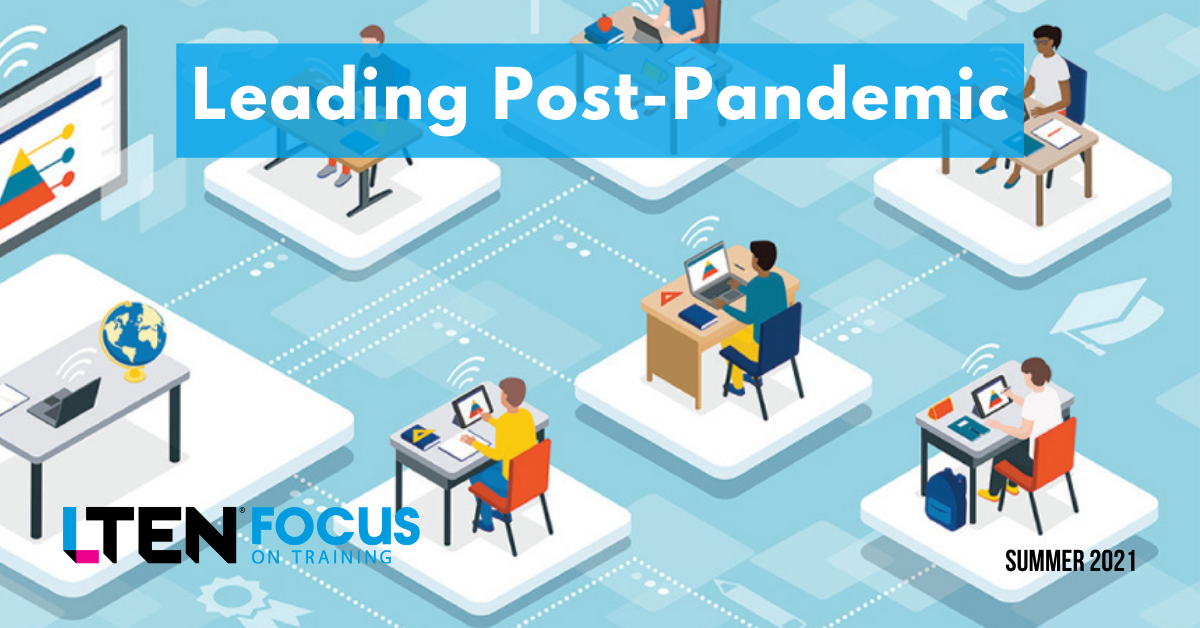
Leading Post-Pandemic
GUEST EDITOR – Eric J Brand
It’s time to challenge your position on virtual learning
 If your experience was anything like mine, at the beginning of 2020, your Q1 focus was ensuring a successful national sales meeting (NSM) and making sure your team had sufficient direction to help to drive change in the organization.
If your experience was anything like mine, at the beginning of 2020, your Q1 focus was ensuring a successful national sales meeting (NSM) and making sure your team had sufficient direction to help to drive change in the organization.
My technology strategy was to implement platforms such as Adobe Connect to help to deliver all the “live” time needed at the NSM for practice, and to support a virtual “pre and post” approach to the NSM that would allow what we trained to be “sticky.”
The world drastically changed in mid-March of 2020 as we went into lockdown. Overnight we pivoted to an all-virtual world. Depending on the risk-tolerance of organizations, some companies allowed their customer-facing representatives to begin field re-entry in Q2, Q3 or even Q4 of 2020, while others still had their field teams sequestered at home, engaging with their customers 100% virtually.
As I write this column, I think of the old adage of the chicken and the egg, and I ask each reader to challenge your position on virtual learning, and what is best for your customers.
It is clear that virtual tools have served us well; however, we had no choice. As we
move forward and plan for the future, are our next steps influenced by a perpetuation of “current-think,” or are we asking our healthcare customers what they want and how we can meet them where they are?
Change Is Here
It’s certain that the pandemic has changed the way we do business. Doing a lunch for an office of 40 in a room the size of a minivan may be something of the past.
Rapid innovation that has taken place with platforms such as Zoom, Webex and Microsoft Teams, as well as the focus on virtual, is making us all better at engaging people in a training setting, either virtually or live. But in the same breath, my hope is that we have taken a step back and learned from our experience, yet not abandoned the in-person skills that drive relationships and set the stage for effective customer interactions and education.
There are many reports circulating weekly from organizations that speak to the future of the life sciences industry, and how we engage our customers. Many report a sometimes “bleak” future where the office no longer needs a rep, or where the preponderance of calls are virtual.
I think it would be foolish to think that our business will go back to the way it was pre-COVID. but I think it’s equally foolish to think that virtual is the only game in town. Some of the data that drives decisions may be biased toward virtual simply based on the fact that many manufacturers have made the decision to keep their people out of the field.
Do we let this solely drive our learning strategies, or have we listened to the customer, and met them where they are?
Have we challenged our leadership to learn from the experience (good and bad), ensuring we take a balanced approach moving forward? Or has everyone been caught up in the new lexicon, and as a result, we end up leaving some skill-building on the table?
Companies like Zoom have gone from niche obscurity a year ago to major players known for innovation today. With all of the accelerated innovation that went into Zoom this past year, the company has invested in the future, has seen that our future state is a hybrid one and has offered Zoom Rooms to support the face-to-face and virtual worlds together.
Points to Ponder
All too often training teams are seen like a drive-through window – as order- takers, not organizational strategic leaders. We are all in a unique position to help lead our organizations into the future. However, it may take some challenging of the status quo, as well as asking some good questions, for us to get there:
- Are we ready for hybrid learning?
- Do the systems and tools we have support hybrid learning?
- We have typically been limited to training talent that was within driving distance to the home office to make up our teams. Can we leverage some of the successes seen by training virtually to now broaden our talent search and have our trainers do more of their jobs remotely? Is this a new job description?
- Are we following – or are we leading?
Eric J. Brand is executive director, training & development for Endo
Pharmaceuticals. Email Eric at brand.eric@endo.com.






